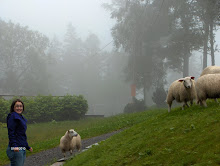...is that I took 3 years of very badly organized Spanish classes.
I'm sure there's a huge variety in language programs, even within a school district. I know that my experience with Spanish was: explanations of grammar, structured dialogue readings, lists of vocabulary grouped by similarities (e.g., parts of the body, seasons, opposites), and occasional, bewildering listening activities in my third year.
And here's what some of the best research on language instruction and acquisition shows:
* A second language is best learned the way a first language is learned. Babies learn first by listening, followed by speaking, then reading, and last, writing. Second language learners should too.
*All examples should be real-world, using genuine examples of the language as it is actually used. For instance, my Spanish book showed getting directions to the museum as a simple process, with a helpful native saying to go left, turn at the orange building, and walk straight. Yet in a real-life encounter, there is gesturing, equivocations, and informal language. Second language learners should listen to real language encounters as much as possible, instead of ones that have been constructed for class, which are more likely to be artificial.
* Mistakes are ok. Toddlers say all sorts of incorrect things, but they grow out of it. Second language learners will as well.
* Teaching together words that are related yet different interferes with learning. For example, if body parts are all taught together, a learner is likely to remember how teeth and toes are related-that they are body parts-and not remember how they are diferent-which part they each apply to.
* Learners can beging listening from day one, and begin speaking from day two. The only way to learn to speak is to speak. Students should get daily opportunities for guided speaking, using whatever information they already have. This helps the students to reduce performance anxiety and get used to spontaneous generation of language. Daily speaking, even in small amounts, is also motor practice for their mouths to make novel sounds.
I wish I knew more about the needs of the children and adults that I will teach this summer, as well as Bethel Ministries' goals for the program. I would like to begin outlining curriculum ideas, but I am unsure about how to move from theory to application without this extra information.
Subscribe to:
Post Comments (Atom)

No comments:
Post a Comment